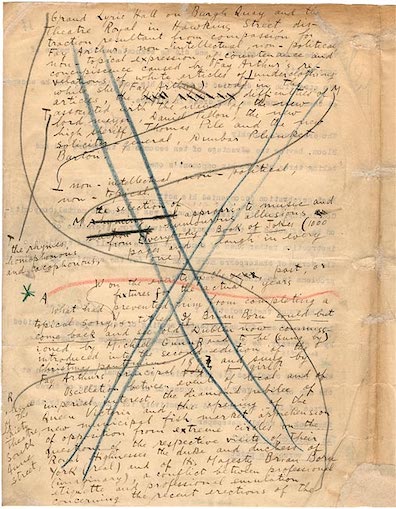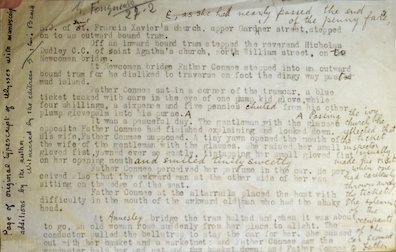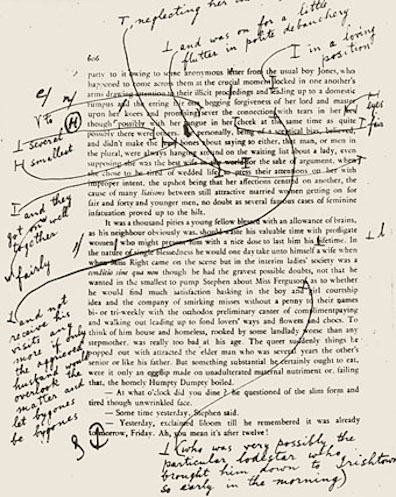One of these obtrusive revisions mars the prose almost
immediately, in the second sentence of the episode: "His
(Stephen's) mind was not exactly what you would call
wandering..." Corraling the reference of stray pronouns
is a chore that afflicts anyone who attempts sentences of
moderate complexity, but the remedy is simple: read what you
have written, ask whether someone who does not know what you
mean would readily understand you, and change unintentionally
ambiguous pronouns to nouns. Here the clause is not even
moderately complex, but the narrator recognizes only in
retrospect that "His" possibly could refer to Bloom.
In the third paragraph the narration conveys Bloom's relief
that Corny Kelleher showed up in Nighttown when he
did––otherwise Stephen "might have been a candidate for the
accident ward or, failing that, the bridewell and an
appearance in the court next day before Mr Tobias or, he
being the solicitor rather, old Wall, he meant to say, or
Mahony which simply spelt ruin for a chap when it got
bruited about." Would Tobias have tried the case, or would it
have been Wall or Mahony? Matthew Tobias was a prosecuting
solicitor for the Dublin police rather than a magistrate, and
Thomas Wall and Daniel Mahony were divisional magistrates, so
the correction is justified. So too, arguably, is its presence
in the text, since the prose tacks so near to Bloom's own
voice––as emphasized by the phrase "he meant to say"––that it
feels almost like a snippet of conversation. But Bloom's
speech in fact is being paraphrased here, not quoted.
Shouldn't the narrator, whether omniscient or not, edit out
Bloom's momentary and completely irrelevant lapse of memory?
If this is a sin, it is a venial one. Several paragraphs
later, however, the failure to rethink and rewrite results in
egregious narrative malpractice. When Stephen goes to talk to
Corley, leaving Bloom standing apart, the narrative recounts
how Corley got the nickname Lord John. His paternal
grandfather, the story goes, married a woman whose maiden name
was Talbot, and she, rumor has it, "descended from the house
of the lords Talbot de Malahide." But this ancestor was a
member of the "house" only in a sardonically punning sense:
"her mother or aunt or some relative, a woman, as the tale
went, of extreme beauty, had enjoyed the distinction of being
in service in the washkitchen." The class difference explains
the ironic joke in "Lord John," but how would a servant have
acquired the Talbot surname, and how would a female have
passed it down to her descendants? The narrator becomes so
mired in details (what kind of blood relation it was, the
woman's beauty, which duties she performed) that he loses
sight of the essential genealogical questions.
This failure to marshall relevant facts before writing proves
merely tedious for a reader, but what happens next is
hilarious. After the narrator very formally concludes his
account ("This therefore was the reason why the still
comparatively young though dissolute man who now addressed
Stephen was spoken of by some with facetious proclivities as
Lord John Corley"), he begins a new paragraph devoted to
Corley's tale of woe. But after five sentences on the new
topic it suddenly occurs to him that he has not explained the
source of the Talbot name: "No, it was the daughter of the
mother in the washkitchen that was fostersister to the heir
of the house or else they were connected through the mother
in some way, both occurrences happening at the same time if
the whole thing wasn't a complete fabrication from start to
finish." Closer now to the promised explanation but
still not quite in possession of it, the narrative begs the
same question as before: if you can't manage to recall
something even half-coherently, why bother to mention it at
all? Worse, the new theme of Corley's poverty has been
sidetracked. It absurdly returns in one brief sentence after
the digression wraps up: "Anyhow he was all in."
It is easy to imagine Bloom saying "No, it was the daughter
of the mother in the washkitchen," but these passages do not
come close to representing his speech or even his thoughts.
While Stephen and Corley are talking and the latter's nickname
is being explicated, Bloom is some distance away, and later
the narrator makes clear that he does not know who Corley is:
"He threw an odd eye at the same time now and then at
Stephen's anything but immaculately attired interlocutor as if
he had seen that nobleman somewhere or other though where he
was not in a position to truthfully state nor had he the
remotest idea when." The word "nobleman" creates an impression
that Bloom is privy to the Talbot speculations, but this may
be yet another instance of ineptitude on the narrator's part.
However much he may have in common with Bloom the character,
he alone is responsible for writing bad fiction.
No other passages in Eumaeus match the comic
brilliance of this one, but the botching of revisions
continues. When Stephen leaves off talking to Corley and
returns to Bloom's company, there is another failure to
control pronouns: "Alluding to the encounter he said,
laughingly, Stephen, that is: / — He is down on his
luck." Here ambiguity occurs because the previous sentence has
described Bloom observing the exchange of money. Again, the
narrator fails to simply replace "he" with "Stephen." Such
usages run riot in Penelope, and they are funny there
too, but in a different way. Molly's monologue feels oral
rather than written, so the uncertain references to "he"
merely characterize her speech.
As the images posted here may suggest, Joyce was a ferocious
reviser, altering Ulysses at every stage from
manuscript to typescript to print. (The printers in Dijon must
have been driven nearly insane by the countless changes that
the Irish writer made until the last possible minute, and beyond.)
The Eumaeus narrator's difficulty with even the
simplest fundamentals of this art offers one measure of the
height of Olympian irony from which his puerile fiction is
being regarded.


